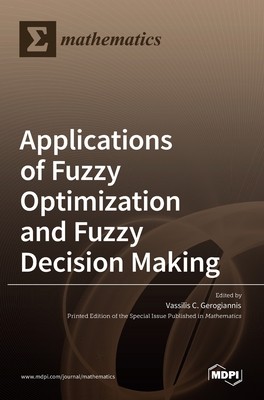
- We will send in 10–14 business days.
- Publisher: MDPI AG
- ISBN-10: 3036522654
- ISBN-13: 9783036522654
- Format: 17 x 24.4 x 3.2 cm, hardcover
- Language: English
- SAVE -10% with code: EXTRA
Applications of Fuzzy Optimization and Fuzzy Decision Making (e-book) (used book) | bookbook.eu
Reviews
Description
The aim of the Special Issue "Applications of Fuzzy Optimization and Fuzzy Decision Making" is to expand the applicability of fuzzy optimization and decision making for solving various types of problems in the areas of economics, business, engineering, management, operations research, etc. Any experimental research or empirical study of theoretical developments in fuzzy optimization and decision making is highly welcome. Additionally, research papers presenting solution methods and/or studying their computational complexity, and proposing new algorithms to solve fuzzy optimization and decision making problems, in an effective and efficient manner, are also welcome. We are looking forward to receive innovative approaches that apply, in practical settings, state-of-the art mathematical/algorithmic techniques from fuzzy technology, computational intelligence and soft-computing methodologies, with the aim to offer robust solutions for complex optimization and decision making problems characterized by non-probabilistic uncertainty, vagueness, ambiguity, and hesitation. Such type of papers will address the suitability, validity, and advantages of using fuzzy technologies and the enhancement of them using intelligent methods to treat real-life problems from various disciplines.
EXTRA 10 % discount with code: EXTRA
The promotion ends in 16d.19:06:36
The discount code is valid when purchasing from 10 €. Discounts do not stack.
- Publisher: MDPI AG
- ISBN-10: 3036522654
- ISBN-13: 9783036522654
- Format: 17 x 24.4 x 3.2 cm, hardcover
- Language: English English
The aim of the Special Issue "Applications of Fuzzy Optimization and Fuzzy Decision Making" is to expand the applicability of fuzzy optimization and decision making for solving various types of problems in the areas of economics, business, engineering, management, operations research, etc. Any experimental research or empirical study of theoretical developments in fuzzy optimization and decision making is highly welcome. Additionally, research papers presenting solution methods and/or studying their computational complexity, and proposing new algorithms to solve fuzzy optimization and decision making problems, in an effective and efficient manner, are also welcome. We are looking forward to receive innovative approaches that apply, in practical settings, state-of-the art mathematical/algorithmic techniques from fuzzy technology, computational intelligence and soft-computing methodologies, with the aim to offer robust solutions for complex optimization and decision making problems characterized by non-probabilistic uncertainty, vagueness, ambiguity, and hesitation. Such type of papers will address the suitability, validity, and advantages of using fuzzy technologies and the enhancement of them using intelligent methods to treat real-life problems from various disciplines.


Reviews